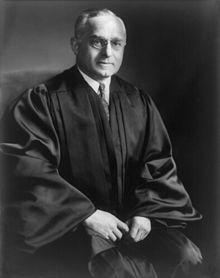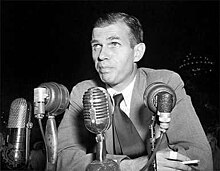Thomas Elliott (lawyer)
Thomas Elliott, AKA Tom Elliott, was a 20th-Century American lawyer who served as first general counsel to the Social Security Administration and was known as one of the Felix Frankfurter's "hot dogs," part of FDR's New Deal Brain Trust.
Career
On October 4, 1935, Elliott's name appears in the press as "general counsel to the Federal Economic Security Commission."[1]
In 1936, his name appeared again as counsel for the "new Social Security Board."[2]
Frankfurter's "happy hot dogs"

On December 2, 1935, Elliott's name appears in the press as one of "50 or 60 members of the Roosevelt brain trust," former students of Professor Felix Frankfurter, then dean of Harvard Law School, placed by Frankfurter into "key positions in the Roosevelt administration," and known as Frankfurter's "happy hot dogs."[3] According to journalist Arthur Sears Henning:
Some of the "better known" of Frankfurter's "happy hot dogs" in 1935 were:
- Dean Acheson, Undersecretary of the Treasury
- Thomas Corcoran, legal staff member of the Public Works Administration
- James M. Landis, head of the Securities and Exchange Commission
- Alger Hiss, "right hand man" of Solicitor General Stanley Reed, U.S. Department of Justice
- Paul Freund, also legal staff member of the U.S. Department of Justice[3]
Other "Frankfurter men" in the New Deal included:
- Benjamin V. Cohen legal staff member of the Public Works Administration
- Jerome Frank, counsel to Reconstruction Finance Corporation, former general counsel of the Agricultural Adjustment Administration
- Charles Wyzanski, solicitor of the U.S. Department of Labor
- Thomas Elliott, general counsel for the new social security organization
- Gardner Jackson, formerly assistant consumers' counsel of the Agricultural Adjustment Administration[3]
Hiss Case involvement

In August–September 1948, Elliott was one of many prominent lawyers who advised Alger Hiss on whether to file a defamation suit against Whittaker Chambers after Chambers stated on NBC Radio's Meet the Press that Hiss had been a Communist.[4]
On August 31, 1948, Hiss wrote to his lifelong friend and fellow Harvard lawyer William L. Marbury, Jr.:
I am planning a suit for libel or defamation... Tom Elliott has just recalled that this man attempted to borrow small sums from him at about the same period that I knew him as Crosley. Tom cannot recall the name under which he knew him... The number of volunteer helpers is considerable: Freddy Pride of Dwight, Harris, Koegel & Casking (the offshoot of young Charles Hughes' firm), Fred Eaton of Shearman and Sterling, Eddie Miller of Mr. Dulles' firm, Marshall McDuffie, now no longer a lawyer; in Washington Joe Tumulty, Charlie Fahy, Alex Hawes, John Ferguson (Mr. Ballantine's son-in-law) and others–but the real job is get general overall counsel and that fortunately is now settled, but we must move swiftly as so far the committee with its large investigating staff and considerable resources has been able to seize the initiative continuously and regularly. Everyone has been most helpful...[4]
References
- ^ "Trenton Facts". The Courier-News of Bridgewater, NJ. 4 October 1935. p. 21. Retrieved 18 August 2017.
- ^
"Inferiority Complex". Review of Reviews. 1936: 29. Retrieved 18 August 2017.
{{cite journal}}: Cite journal requires|journal=(help) - ^ a b c Henning, Arthur Sears (4 October 1935). "New 'Hot Boss' Fears High Courts: Laws So 'Learned' They Defeat Purpose". Chicago Tribune. p. 21. Retrieved 18 August 2017.
- ^ a b Hiss, Alger (31 August 1948). "(Letter to William Marbury)". Maryland Historical Society. Retrieved 29 September 2017.
